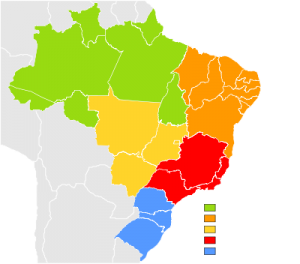Political
Brazil political and legal system has been governed as a Federal Republic since 1985 and consists of 26 states and a federal district. These states are divided into five regions, namely:
- North (Acre, Amapá, Amazonas, Pará, Rondônia, Roraima, Tocantins)
- North East (Alagoas, Bahia, Ceará, Maranhão, Paraíba, Pernambuco, Piauí, Rio Grande do Norte, Sergipe)
- Central West (Goiás, Mato Grosso, Mato Grosso do Sul, Federal District)
- South East (Espírito Santo, Minas Gerais, Rio de Janeiro, São Paulo)
- South (Paraná, Rio Grande do Sul, Santa Catarina).
Legislative Bodies
- Federal: Chamber of Deputies (513 seats), Senate (81 seats)
- States: Unicameral legislatures in each state and in the Federal District
- The presidential elections run every four years and the president can be elected for a maximum of two four?year terms.
Legal System
Brazil is a federative republic, constituting an indissoluble union of States, Municipalities, and the Federal District.
Brazil’s legal system is codified, and laws are issued by the Federal Government, States, and Municipalities, each within its own sphere of authority. Court decisions entail correct application of current Brazilian laws. When no specific legal provision exists, courts decide based upon analogy, custom, and general legal principles. Legal precedents do not bear the force of law in Brazil, though they may play a significant supporting role in specific court decisions.
Federal Constitution
To understand how Brazil is ticking it might be wise for foreign investors to read a few articles of the constitution and compare this with the constitution in your own country. I took article 3 of the Federal Constitution as an example:
Article 3
The fundamental objectives of the Federative Republic of Brazil:
I – to build a free society, justice and solidarity;
II – guarantee national development;
III – to eradicate poverty and marginalization and reduce social and regional inequalities;
IV – to promote the good of all without distinction as to origin, race, sex, color, age and other forms of discrimination.
The Federal Constitution provides for the legislative authority of the Federal Government, States and Municipalities, thus avoiding redundancy or overlapping of jurisdictional spheres. In consonance with principles laid down in the Federal Constitution the legislative authority of the Federal Government supercedes that of States and Municipalities.
The Federal Government is thus vested with exclusive authority to legislate on civil, commercial, criminal, procedural, electoral, agrarian, maritime, aeronautical, space, and labor law; expropriation, water, power, informatics, telecommunications, radio broadcasting, monetary system, foreign exchange, credit policy, insurance, foreign trade, mineral deposits, nationality, citizenship, and other matters.
The Federal Constitution authorizes the Federal Government, States and the Federal District to legislate concurrently regarding such matters as: taxation, financial, economic, and prison law; production and consumption; environmental liability and consumer rights; education and teaching; social security, social protection, and health. On such issues, the authority of the Federal Government is limited to setting general guidelines, whereas that of the States and the Federal District is circumscribed by enabling legislation, observing general guidelines of federal legislation.
The Federal Constitution is the keystone of the Brazilian legislative system. It ensures the citizen fundamental rights and guarantees, and determines the political and administrative structure of the Federative Republic of Brazil. It defines the respective spheres of authority of the Executive, Legislative and Judicial Branches; orients the tax system; and provides for economic and financial policy, and the social order. Organization and government of the States is provided for in their own constitutions and laws, observing principles laid down in the Federal Constitution.
Brazil’s main legal texts are Codes, compiling basic legislation. The most prominent of these are: the Civil Code, the National Tax Code, the Penal Code, the Consolidated Labor Laws, the Code of Civil Procedure, and the Code of Penal Procedure. None of these codes takes precedence over the Federal Constitution, which is the supreme law of Brazil.
Sources: Legal Guide for Foreign Investors in Brazil, Publication of the Ministry of External Relations; Wikipedia
Updates: Removed original text of the chapter Legal System, which contained a principle error and replaced by the text from “Legal Guide for Foreign Investor in Brazil”, a publication of the Ministry of External Relations; Added Article 3 of the constitution to provide insights in the Brazilian culture. Attributions: Sven


